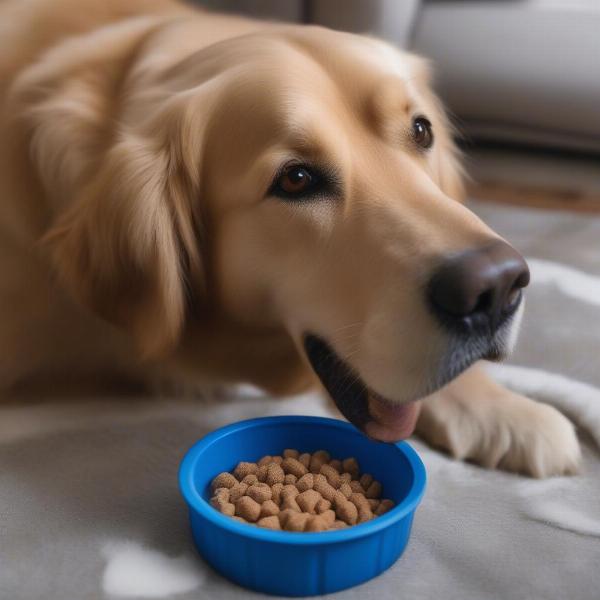Nourishing your senior dog properly is crucial for maintaining their health and happiness during their golden years. As dogs age, their nutritional needs change, and choosing the right food for older dogs is essential for supporting their overall well-being and managing age-related health issues. This comprehensive guide delves into the specific dietary requirements of senior dogs and helps you make informed decisions about their nutrition.
Understanding Your Senior Dog’s Nutritional Needs
As your furry friend enters their senior years, their metabolism slows down, and they become less active. This means they require fewer calories to maintain a healthy weight. However, their need for specific nutrients, such as protein, vitamins, and minerals, remains crucial, and in some cases, even increases. Choosing food for older dogs isn’t just about reducing portions; it’s about providing the right balance of nutrients for optimal health.
 Senior Dog Eating from a Bowl
Senior Dog Eating from a Bowl
The Importance of Protein
Protein is essential for maintaining muscle mass, which can naturally decline with age. Look for food for older dogs with high-quality protein sources, such as chicken, fish, or lamb. These proteins are easily digestible and provide the necessary amino acids for muscle health. A diet rich in protein can help prevent muscle loss and keep your senior dog strong and active.
Essential Fatty Acids for Joint Health
Older dogs are more prone to joint pain and stiffness. Including omega-3 fatty acids, like those found in fish oil, can help reduce inflammation and support joint health. When selecting food for older dogs, look for options enriched with these beneficial fatty acids. best pet food for older dogs can provide these essential nutrients.
Fiber for Digestive Health
As dogs age, their digestive systems can become more sensitive. Adding fiber to their diet can help regulate bowel movements and prevent constipation. Food for older dogs often contains added fiber from sources like beet pulp or brown rice.
Choosing the Right Food for Older Dogs
With so many options available, choosing the best food for your senior dog can be overwhelming. Here’s a breakdown of factors to consider:
- Age and Breed: Different breeds age at different rates. Consider your dog’s specific breed and age when selecting their food.
- Activity Level: A more active senior dog will require more calories than a less active one.
- Health Conditions: If your dog has any underlying health conditions, such as kidney disease or diabetes, consult your veterinarian for specific dietary recommendations. They may suggest soft foods for senior dogs or a specialized diet.
Common Feeding Mistakes to Avoid
- Overfeeding: Senior dogs require fewer calories, so avoid overfeeding, which can lead to obesity and exacerbate health problems.
- Feeding Table Scraps: While tempting, table scraps can be unhealthy and disrupt your dog’s balanced diet. Stick to specially formulated food for older dogs.
- Ignoring Dental Health: Dental issues are common in older dogs. Choose kibble that promotes dental health or consider adding dental chews to their routine.
What if My Senior Dog Won’t Eat?
Loss of appetite can be a sign of underlying health issues, so it’s important to consult your vet if your senior dog suddenly stops eating. Sometimes, simply switching to a more palatable food for older dogs, like dog food for older dogs, can entice them to eat again.
Conclusion
Providing the right food for older dogs is a vital part of ensuring their health and happiness in their later years. By understanding their changing nutritional needs and choosing appropriate food, you can help your senior companion enjoy a vibrant and fulfilling life. Remember to consult with your veterinarian for personalized dietary recommendations.
FAQ
- What is the best type of food for older dogs? The best type of food depends on your dog’s individual needs. Consult your vet for recommendations.
- How much should I feed my senior dog? Follow the feeding guidelines on the food packaging and adjust based on your dog’s weight and activity level.
- Can I give my senior dog supplements? Consult your veterinarian before giving your dog any supplements.
- What are signs of dental problems in older dogs? Bad breath, difficulty chewing, and red or swollen gums can indicate dental problems.
- Why is my senior dog losing weight? Weight loss can be due to several factors, including dental issues, decreased appetite, or underlying health problems. Consult your vet.
- How can I encourage my senior dog to eat? Try warming their food, adding a small amount of low-sodium broth, or switching to a more palatable food.
- When should I switch my dog to senior food? Consult your veterinarian for the best time to transition your dog to senior food, but generally, it’s around 7-9 years old for larger breeds and slightly later for smaller breeds.
ILM Dog is a leading international website dedicated to providing expert advice on all aspects of dog care and companionship. We offer valuable resources on dog breeds, health, training, nutrition, grooming, and much more. From puppyhood to senior years, we’re here to help you navigate every stage of your dog’s life. Whether you’re looking for the butchers best dog food or need oscar mayer hot dogs nutritional info, ILM Dog is your trusted source. Contact us today at [email protected] or +44 20-3965-8624 for personalized guidance. ILM Dog is your one-stop shop for all things canine.